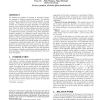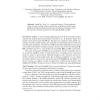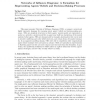52 search results - page 8 / 11 » Propositional Games with Explicit Strategies |
SIGECOM
2006
ACM
14 years 1 months ago
2006
ACM
Games may be represented in many different ways, and different representations of games affect the complexity of problems associated with games, such as finding a Nash equilib...
CORR
2010
Springer
13 years 7 months ago
2010
Springer
Decentralized multiple access channels where each transmitter wants to selfishly maximize his transmission energyefficiency are considered. Transmitters are assumed to choose freel...
ATAL
2006
Springer
13 years 11 months ago
2006
Springer
We address the problem of learning in repeated N-player (as opposed to 2-player) general-sum games. We describe an extension to existing criteria focusing explicitly on such setti...
CADE
1998
Springer
13 years 11 months ago
1998
Springer
Abstract. leanK is a "lean", i.e., extremely compact, Prolog implementation of a free variable tableau calculus for propositional modal logics. leanK 2.0 includes additio...
JAIR
2008
13 years 7 months ago
2008
This paper presents Networks of Influence Diagrams (NID), a compact, natural and highly expressive language for reasoning about agents' beliefs and decision-making processes....



